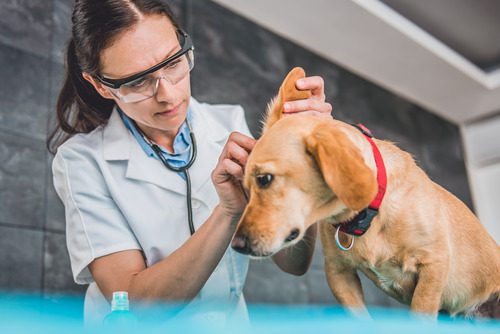My Dog’s Ear is Bleeding: What Do I Do?

Finding blood on your dog’s ear can be alarming, and it’s natural to feel concerned. Whether it’s from scratching, an infection, or an injury, a bleeding ear requires attention. In this blog, we’ll explore what could be causing your dog’s ear to bleed and what steps you should take to ensure their comfort and health. If you’re ever unsure, don’t hesitate to call Happy Tails Emergency Veterinary Clinic for guidance and immediate care. Keep reading to learn more about this concerning situation and how you can help your dog feel better.
Reasons for Ear Bleeding in Dogs
If your dog’s ear is bleeding, it’s important to understand why this might be happening. Several causes can lead to a bleeding ear, from minor injuries to serious health issues. Below are some of the most common culprits:
Ear Infections
Ear infections are one of the most common causes of ear discomfort in dogs, and they can sometimes result in bleeding. The infection might be due to bacteria, yeast, or even parasites like ear mites. When the infection causes inflammation, it can lead to redness, swelling, and in some cases, bleeding. If your dog’s ear is also warm to the touch, has a foul odor, or is shaking their head, an ear infection is a likely culprit.
Injury or Trauma
Dogs are curious creatures, and they may injure themselves by scratching their ears too vigorously, getting into a fight with another animal, or simply getting caught on something while playing outside. An injury can cause the ear to bleed, especially if the skin on the ear has been torn. If your dog has been scratching or rubbing their ear excessively, it could lead to minor trauma that causes bleeding.
Hematomas
Aural hematomas occur when blood vessels in the ear flap break, usually due to excessive scratching or head shaking. This causes a pocket of blood to form, which can make the ear swell and potentially bleed. While this condition isn’t always life-threatening, it can be painful and may require medical treatment to prevent further complications.
Ear Mites or Fleas
External parasites, like ear mites or fleas, can cause significant irritation in a dog’s ears. Ear mites, in particular, cause intense itching and can lead to inflammation, sores, and bleeding if your dog scratches excessively. Fleas might also bite and irritate the skin on the ear, leading to small wounds that can bleed.
Signs Your Dog’s Ear Injury May Be Serious
While some causes of ear bleeding are relatively harmless, others may require immediate veterinary attention. Recognizing signs that the situation could be more serious is crucial for your dog’s health.
Severe Swelling or Deformity
If your dog’s ear becomes severely swollen, it could indicate a more serious condition, such as a hematoma or infection. Swelling can cause discomfort and even affect your dog’s ability to move their ear. Your veterinarian may need to drain the hematoma or treat the infection to prevent complications.
Persistent Bleeding
While minor bleeding may stop after a short period, persistent or heavy bleeding from your dog’s ear should not be ignored. If the bleeding continues despite efforts to stop it, it could indicate a more severe injury or infection that requires professional treatment.
Foul Odor
A strong, unpleasant smell coming from your dog’s ear is often a sign of an infection. If the odor is accompanied by discharge or blood, it’s important to get your dog checked by your veterinarian to prevent the infection from spreading or worsening.
Lethargy or Loss of Appetite
If your dog appears lethargic or isn’t eating, it could be a sign that they’re in pain or feeling unwell. Infections or injuries that cause bleeding may make your dog feel sick, so if these symptoms are present, it’s essential to seek veterinary attention promptly.
How to Stop Your Dog’s Ear from Bleeding
If your dog’s ear is bleeding, your first step should always be to try and stop the bleeding. Here’s what you can do while preparing to visit the vet:
- Apply Gentle Pressure: Use a clean cloth or gauze to gently apply pressure to the bleeding area. Hold it in place for several minutes to help the blood clot. Be careful not to press too hard or irritate the ear further, as this could make the bleeding worse.
- Keep Your Dog Calm: It’s important to keep your dog as calm as possible during this process. Anxiety can make your dog’s heart rate increase, which might cause more blood to flow to the area. Encourage your dog to rest in a quiet area until you can get them to the vet for further evaluation.
- Avoid Using Home Remedies: While it might be tempting to use home remedies, such as antiseptic creams or powders, it’s best to avoid applying anything to your dog’s ear without consulting a vet. Some substances can irritate the ear further or delay proper treatment.
When Should You Seek Veterinary Care?
Even if you’ve successfully stopped the bleeding, it’s always a good idea to consult your veterinarian to ensure that your dog’s ear heals properly. Veterinary care is essential in the following situations:
Persistent Symptoms or Recurrence
If your dog’s ear starts bleeding again or the symptoms persist, it’s time to see your vet. Recurring bleeding could be a sign of a deeper issue, such as an infection, growth, or foreign object in the ear canal that needs to be addressed.
Visible Infection Signs
If the ear appears red, inflamed, or if there’s pus or discharge, this could indicate an infection. Your veterinarian will be able to diagnose the type of infection and recommend the appropriate treatment, which may include antibiotics or antifungal medications.
Pain or Difficulty Moving the Ear
If your dog seems to be in pain or is unable to move their ear, it’s a sign that the injury might be more serious. This could be due to nerve damage, hematomas, or an advanced infection. Only your vet can assess the severity of the injury and provide the necessary treatment.
How to Prevent Ear Injuries and Infections in Dogs
While ear bleeding can happen unexpectedly, there are preventive steps you can take to minimize the risk of ear injuries and infections in the future.
- Regular Ear Cleanings: Routine ear cleanings can help prevent infections and keep your dog’s ears free from debris. Be sure to use a gentle, dog-safe ear cleaner, and avoid inserting anything into the ear canal. If you’re unsure how to clean your dog’s ears properly, ask your veterinarian for guidance.
- Monitor for Ear Mites and Fleas: Regularly check your dog’s ears for signs of parasites like ear mites and fleas. If you notice excessive itching, dark discharge, or small bites on your dog’s ears, consult your vet for appropriate treatment to address these external parasites.
- Avoid Trauma: Be mindful of your dog’s behavior, especially if they’re prone to scratching or shaking their head excessively. If your dog’s ears are irritated from an allergy or infection, it can lead to trauma and possible bleeding. Keeping an eye on their ear health and seeking early intervention can prevent further damage.
If your dog’s ear is bleeding, it’s essential to stay calm and take immediate action. Apply gentle pressure, keep them calm, and get them to your veterinarian for a thorough examination. Happy Tails Emergency Veterinary Clinic is equipped to help with all your pet care needs. Call us today at (336) 288-2688 for expert advice.
Recent Posts
About Us
At Happy Tails Veterinary Emergency Clinic in Greensboro, NC, our kind and knowledgeable team is available to provide gold standard emergency vet care for you and your pet. We’re available in the late night and early morning hours during the week, and 24/7 on weekends for your convenience.
